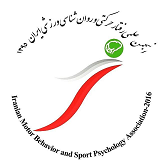Thu, Apr 18, 2024
[Archive]
Volume 5, Issue 1 (2-2023)
Abstract
(1770 Views) |
Full-Text (PDF)
(833 Downloads)
| Highlights
- Creativity includes measures of fluency, flexibility, and originality and is important for learning motor skills.
- Non-linear pedagogy leads to increased motor creativity and creative thinking in children.
- Memory inhibition affects children's motor learning, and children with high memory inhibition are more successful in learning motor tasks.
- Cognitive thinking and motor creativity in children with high memory inhibition are more than in children with low memory inhibition.
Abstract
(1852 Views) |
Full-Text (PDF)
(984 Downloads)
| Highlights
- Hand-eye coordination is the key and foundation of fine motor skills in motor development.
- The most widely used hand-eye coordination test is the Grooved Pegboard Test (GPT).
- The most important factors in coordination are: person, environment and task.
- Hand-eye coordination performance is more influenced by the cognitive aspect and information processing.
Abstract
(1960 Views) |
Full-Text (PDF)
(920 Downloads)
| Highlights
- Strong evidence reported executive function improvements with electronic gaming.
- Moderate evidence supported electronic gaming for motor skills.
- Moderate evidence supported electronic gaming for social and emotional health.
- Positive caregiver and participant perceptions may enhance compliance.
- Screen-time guidelines and caregiver involvement can offset potential harm.
P. 31-35
Abstract
(1294 Views) |
Full-Text (PDF)
(223 Downloads)
| Highlights
- The errorless method reduces conscious process and cause the implicit memory formation.
- In motor task (tow-step ball throwing), fatigue didn’t cause performance deterioration.
- The errorless training method improves motor performance even under cognitive and physical fatigue conditions.
P. 36-44
P. 45-51
Abstract
(1321 Views) |
Full-Text (PDF)
(410 Downloads)
| Highlights
- The combined exercises (physical-psychological) may increase the sports performance scores in Kung Fu fighters.
- Physical and psychological interventions also increase the bold behavior and its components score in Kung Fu fighters.
- Psychological skills make the athlete feel progress and gain self-confidence during the competition.
- Developing physical skills require practicing the part that needs strengthening to improve performance.









